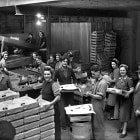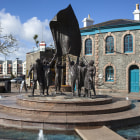
Jack Thomas Counter was awarded the Victoria Cross, Britain’s highest order of gallantry, for his actions during the First World War in 1918.
After finishing his service enlistment period, Counter left the army as a Corporal. In 1919, his battalion was stationed in Jersey, and when discharged in 1921, he came back to settle on the Island that he so fondly remembered, finding a job as a postman at the St. Ouen’s post office until 1925. Thereafter, he went back to England for a few years, working at a post office in Sudbury Common, Middlesex, before being drawn back to the Island for the final time in 1929. Continuing his postal job (this time in St. Helier), he married Ada Vauvert in 1921, and the couple had a daughter named Pearl. The family settled in First Tower, in an area now named ‘Jack Counter Close’. Counter was a well-known member of the local Royal British Legion, where he served on the committee and was often the standard bearer at remembrance parades.
Counter passed away in 1970, in his old home, while on a trip to Blandford with his sister, Gertrude. His ashes are interred at St Saviour’s Church. Private Counter’s actions on that day in 1918 have been memorialised in a number of ways, to forever preserve the memory of his selflessness and courage. A plaque can be found at St. Andrew’s Church, First Tower, while in Blandford, an English Heritage blue plaque can be found on the house in which he lived. In 1971, the Jersey Post Office released stamps in celebration of the 50th anniversary of the Royal British Legion, with one dedicated to Jack Counter, featuring his portrait and an illustration of a Victoria Cross.

First Day Cover issued by Jersey Post to mark the 50th Anniversary of the British Legion
Purchased by the Société Jersiaise in 1989, Jack Counter’s medals are now a permanent part of the museum collections. As well as the VC, his medals include the British War Medal 1914-20, the Victory Medal 1914-19, the Imperial Service Medal, the King George VI Coronation Medal and the Queen Elizabeth II Coronation Medal. Counter, displaying his selfless attitude, had always conveyed that it was not he who was due the praise and honour of a hero, but the five men who preceded him. He is quoted as saying ‘the ones who died before me should have had it’, ‘I was lucky.’

Six medals awarded to Jack Counter, including the Victoria Cross.









